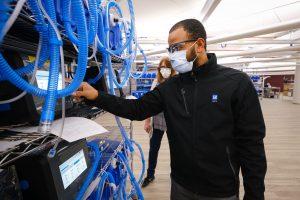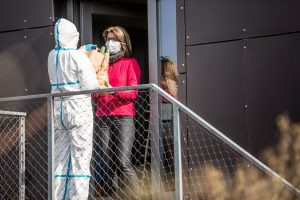Resilience is the capacity to bounce back, to cope with crisis, to recover quickly from difficulties and return to pre-crisis status. There are multiple aspects of resilience – psychological, emotional, physical and social. Societal resilience is the ability of a human community to cope with and adapt to stresses and change.
COVID-19 sprang up in China in January 2020 and then blasted into South Asia, Japan, Australia, New Zealand, Italy, through Europe, the Middle East, the United States, and seized the world in its pandemic. It continues its march into Central and South America and on to the African continent, and communities worldwide continue to struggle to gain control of the outbreak.
Moving away from climate change
Before COVID-19, the principal discussion around societal resilience was the debate about climate change and how much time mankind had before the world’s weather would become untenable. But as disruptions from COVID-19 grew, focus shifted quickly from a projection of the environment’s decline to the very immediate crisis in our midst. Cities and states redirected budgets and planning away from climate resilience to meet the immediate threat and impact of the pandemic.
“This is a mistake,” said Alice Steenland, Chief Sustainability Officer, Dassault Systèmes. “We are facing a health crisis which resulted from an environmental crisis: zoonotic diseases like COVID-19 are a result of environmental degradation of wildlife habitat. We also know that as the climate warms, countries in the northern hemisphere will see more and more viruses arriving that used to be confined to the tropics. Resilience is not about social or environmental issues – it is about understanding the interdependency of systems and trying to be as adaptable as possible, knowing that the number of shocks will only increase in the coming decades.”
Sustainable response now and long-term
Adding the enormous stress that COVID-19 is putting on countries, systems and infrastructures to the existing threat of climate change emphasizes the need for sustainable approaches to societal resilience, both now – as the world combats the virus – and for the long term.
In terms of people and industry and societal systems, we need to recognize that societal resilience can come in many forms and at many levels. That’s where, right now, in the COVID-19 crisis, individuals and organizations and companies are stepping up and stepping in. Here are some examples:
Building PPE and Ventilators
Companies like Ford and General Motors and an innovative ventilator manufacturer called Ventec
At Ford, a task force designed, produced and delivered in less than a week a face shield needed by healthcare workers as part of their Personal Protective Equipment (PPE). The shield is built with less than a dozen parts, and they all come from Ford’s existing inventory.
General Motors (GM) quickly worked out how to adapt its manufacturing capabilities to build Ventec’s ventilator design. GM’s global purchasing and supply chain team sourced the over 400 different parts needed to build it, and operations transformed a facility that made electronic car components into a ventilator factory. You can see details on the story here.

Partnering to supply meals
Organizations like World Central Kitchen
The non-profit organization World Central Kitchen has served more than 16 million meals in disaster-stricken areas including Haiti, Venezuela and Puerto Rico. Founded in 2010 by Michelin star chef José Andrés, now it has partnered with hundreds of restaurants that would otherwise be closed during the pandemic, supplying meals for front-line workers and those in need across more than 100 US cities.

They then work with companies like Uber, Caviar and GrubHub that already have systems in place to deliver meals. Instead of small businesses being temporarily closed and their employees out of work, they continue their natural role as a food distribution chain to the public. See details on the story here.
“It’s a logistics issue,” observed Steenland. “How do you move goods and services throughout a society? How do you re-purpose logistics chains, factories, restaurants, hotels for different types of needs?”
People answering peoples’ need
First responders meet the challenge
In the pandemic, everywhere in the world, tens of millions of frontline workers – including doctors, nurses, ambulance drivers, emergency responders, store clerks, delivery drivers and individuals – do what’s needed now, every day.
In the US, many people are challenged with shortages of food. Although demand at food pantries has grown, farmers have destroyed crops and milk that they can’t sell because normal distribution is disrupted with restaurants, hotels and schools shut down.

Now groups and government are responding. Grass-roots efforts have started, such as college students launching a website to connect farmers with food banks and renting trucks to move unsold products. Federal and state governments are now buying surplus vegetables, fruit, milk and meat from distributors and shipping them to food banks. Industry co-operatives are diverting supplies as well.
Addressing further societal impacts
Long-term strategies take shape
McKinsey & Company, the worldwide strategy and management consulting company, as part of their COVID-19 coverage, explored four societal impacts for society:
- Investing in lives and livelihoods – Some demographic groups will be impacted more from COVID-19 due to health, employment, and economic suffering already embedded in their communities. This crisis could be used as an opportunity to increase the resilience of communities and institutions by applying analytics to help erase bias in access to health treatment, investing in telehealth and expanding broadband communications to increase access to education.
- Returning to resilience in behavioral health – Behavioral-health issues sparked by COVID-19 will impact our collective resilience in such areas as addiction, depression, substance-abuse, and their economic and social costs. Pragmatic approaches, such as community outreach, supporting basic food, housing, and healthcare needs during a crisis, and innovations such as telemedicine to reach more at-risk citizens can help in recovery.
- Planning for higher education – COVID-19 will define an entire generation of young adults. Students were sent home from all corners of the world in a matter of days. Fields of studies that require hands-on training, like medicine and performing arts, are on hold. All students are facing a dismal employment outlook. Concrete steps are needed to keep students and faculty safe, and learning alive.
- Addressing climate change – Even in a world fighting a pandemic, climate change cannot be ignored. Going forward, behavioral changes like teleworking and virtual events could continue and help mitigate effects of climate change. Supply chains could be localized, reducing certain emissions. European cities have experienced up to 75% reduction in CO2 directly linked to the lockdown. China’s CO2 emissions were temporarily cut by 25%, during the country’s lockdown. In the US, electricity demand hit a 16-year low in late April 2020.
Approaching a tipping point
For all of the world, resilience has become a daily concern, from the most technologically advanced regions and economies to the most basic environs.
Steenland summarized the situation:
“How far down the path do we have to go before we’re ready to change? Climate change, rising sea levels, massive draught, heat waves, fires in California and Australia, the Coronavirus. How many signals do we need and how many shocks before we take the information that we know – which is a vast amount because all of these shocks have been predicted for years – and use it to build a more sustainable, resilient economy?”
The lessons we learn – and apply – from this COVID-19 crisis are sure to have a lasting impact on how resilient our society can be.

